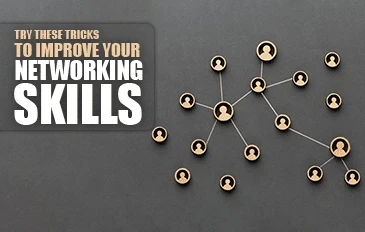
Try These Seven Tricks to Improve Your Networking Skills
Networking is one of the most important aspects of a successful career, but it can also be one of the most intimidating. For most people, the thought of walking into a room full of strangers and trying to make connections is overwhelming. But, like anything else, it can be learned and improved on with practice. These tricks will help you get started.
Do Your Research in Advance
The best way to feel confident is to know what you’re hoping to achieve. Before attending a networking event, take some time to learn about the people who’ll be in attendance—read their biographies, any articles they’ve written, and some information about their business, and consider what exactly you can offer them. This research will give you a better sense of who you might want to talk to and what topics might spark their interest. It’ll also help you come up with conversation starters, focus on your goals for the event, and make a good impression. Review your elevator pitch so you’re prepared to introduce yourself confidently.
Arrive Early
Environmental cues can greatly impact our mood and behavior, so it’s important to be mindful of the messages you send with your body language when you’re networking. Arriving early at an event is a great way to show interest and enthusiasm. It gives you the opportunity to scope out the room, chat with other attendees before the event gets too crowded, and get a feel for the atmosphere; it can also help you avoid the awkwardness of being one of the last people to arrive.
Be an Active Listener
One of the most effective networking skills is active listening. Listen attentively to what the other person is saying. Show genuine interest in their work and experiences. The best way to build rapport with someone is to ask them questions about their job and hobbies: not only does this make conversations more interesting, it also shows the other person that you’d like to get to know them better. People are more likely to remember you if they feel like you truly listened to them and invested in the conversation. Take the initiative and be friendly and engaging. Smile, make eye contact and exude positive energy.
Dress for Success
You never get a second chance to make a first impression, so it’s important to dress for the occasion. Choose an outfit that’s both stylish and professional, and that makes you feel confident. It’s also important to pay attention to your grooming, so ensure your hair is styled. If you wear makeup, make sure it’s minimal; you want people to focus on your conversation, not your appearance. Finally, avoid wearing strong fragrances, as some people may be allergic or dislike the smell. You’ll feel more confident when you look your best and can make a better impression on potential contacts.
Bring Plenty of Business Cards
Even if you aren’t seeking new business contacts, always bring business cards so people can be reminded of your conversation after they leave the event. And don’t forget to personalize them with something unique about yourself. Business cards are an excellent way to leave a lasting impression and can be a valuable tool for developing meaningful engineering relationships. They’re also an easy way to exchange contact information and can help people remember who you are and what you do. So before heading out to that event, make sure you have plenty of business cards with you. That way, you’ll be prepared to make new contacts and easily hand out your information. By staying connected with the people you meet, you can build strong relationships that can lead to your career advancement.
Start Small
Another effective approach to improving your skills is to start small. Rather than trying to approach everyone in the room at once, start by talking to one or two people who interest you. This will give you a chance to practice your conversation starters and help you feel more comfortable talking to new people. It’ll also make networking less overwhelming and allow you to focus on building relationships rather than collecting contacts. Once you’ve mastered the art of conversation starters, you can start approaching larger groups of people with confidence.
Follow-Up After the Event
After attending a networking event, it’s important to follow up with the people you meet. You can do this by sending a quick email or LinkedIn message. Mention something you talked about in conversation and invite them to keep in touch. Following up shows that you’re interested in developing a relationship, which may even lead to a future opportunity.
Conclusion
If you’re not a natural networker, never fear. These tips and tricks can help anyone to become a skilled networker. The most important thing is to get started and to keep working at it. The more practice you have, the more confident you’ll become. And who knows? Over time, you might even come to enjoy networking. So go out there and start meeting people—you never know who you’ll meet, or where your next opportunity will come from.
Michael DeSafey is a leading executive recruiter for professionals in the construction, engineering, and environmental industries. He is currently the President of Webuild Staffing: www.webuildstaffing.com. To learn more about Michael, or to follow his blog, please visit www.michaeldesafey.com.
